Return of Daimajin Blu-ray Movie
HomeReturn of Daimajin Blu-ray Movie 
大魔神怒る / Daimajin ikaruArrow | 1966 | 79 min | Not rated | No Release Date
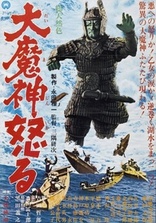
Price
Movie rating
7.2 | / 10 |
Blu-ray rating
| Users | 0.0 | |
| Reviewer | 3.0 | |
| Overall | 3.0 |
Overview
Return of Daimajin (1966)
The tyrannical Lord Danjo Mikoshiba covets the rich, fertile lands surrounding Lake Yakumo. During a memorial ceremony for the late Chigusa lord, Mikoshiba launches an attack, overthrowing the honorable Lord Juro. Just when all seems lost, Daimajin rises from Lake Yakumo to settle a score of his own.
Starring: Kōjirō Hongō, Taro Marui, Asao Uchida, Sei Hiraizumi, Kōji FujiyamaDirector: Kenji Misumi
| Foreign | Uncertain |
| Drama | Uncertain |
| Supernatural | Uncertain |
| Action | Uncertain |
| Fantasy | Uncertain |
Specifications
Video
Video codec: MPEG-4 AVC
Video resolution: 1080p
Aspect ratio: 2.35:1
Original aspect ratio: 2.35:1
Audio
Japanese: DTS-HD Master Audio Mono
English: DTS-HD Master Audio Mono
Subtitles
English
Discs
Blu-ray Disc
Single disc (1 BD)
Playback
Region A (B, C untested)
Review
Rating summary
| Movie | 3.0 | |
| Video | 3.5 | |
| Audio | 3.5 | |
| Extras | 3.0 | |
| Overall | 3.0 |
Return of Daimajin Blu-ray Movie Review
Reviewed by Jeffrey Kauffman July 29, 2021 Note: This version of this film is available on Blu-ray as part of The Daimajin Trilogy.
Arrow Video's relatively recent release of Django
4K
+ Texas, Adios BD caused me to jokingly ask, "When is a Django film not 'really' a Django film?", and in that regard
I'd
like to take a cue from a reliably ebullient Kim Newman who, in a supplementary introduction to the three Daimajin films collected by
Arrow for this new
release, suggests that this so-called "trilogy" may not in fact be properly termed as such. As several of the supplements spread across this three
disc
set get into, the general flailing of the Japanese film industry and the particular straits Daimajin producing studio Daiei found itself in by
the
mid-sixties meant that when some idea hit with the public, it was played for all it was worth, and in that regard the three Daimajin films
are
probably a salient example, since, as Newman and some of the commentators mention, the three films basically tell the same tale with slight
differences. The third film, called Wrath of Daimajin here, but Daimajin Strikes Again on a previous release on Blu-ray (see
below),
arguably offers the most distinctive ambience due to its emphasis on children, something that (as is again mentioned in some of the supplements)
tends to link that film, at least subliminally, with Daiei's "other" big "monster franchise" of this same period, Gamera. One of the kind of funny things about all three
Daimajin films is that, as commentators Tom Mes and Jasper Sharp discuss in their analysis of the second film, their entire raison d'etre
was ostensibly their special effects, and
yet for the most part all three films offer around one hour of largely effects free narrative before releasing the kraken (so to speak) in the final few
minutes.
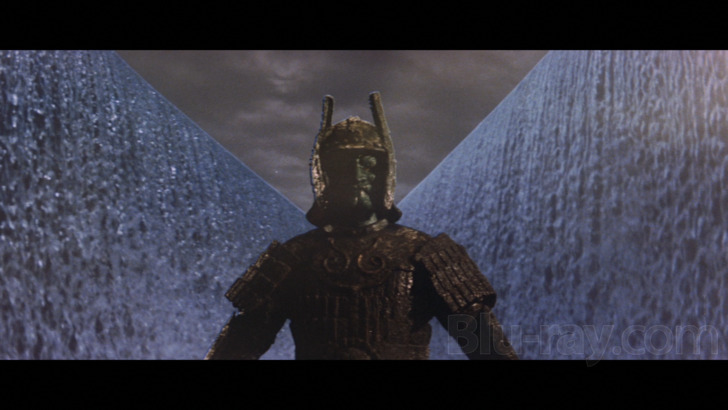
All three Daimajin films were aggregated in a previous release on Blu-ray by Mill Creek Entertainment, and for those wanting plot recaps, I refer you to my colleague Martin Liebman's Daimajin / Return of Daimajin / Daimajin Strikes Again Blu-ray review. Marty's review is also a good resource for those who like to compare screenshots, as well as to see what supplements each version offers. As I've often repeated, "different reviewers means different opinions", and so you will see my scores may vary from Marty's.
Return of Daimajin Blu-ray Movie, Video Quality 
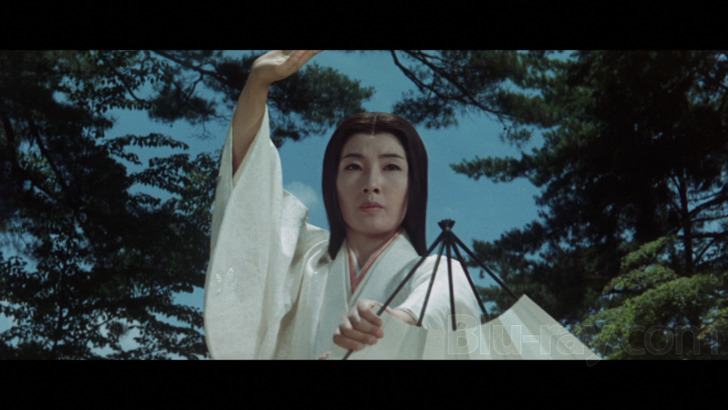
Return of Daimajin is presented on Blu-ray courtesy of Arrow Video with an AVC encoded 1080p transfer in 2.35:1. Arrow's insert booklet contains only the following fairly generic verbiage about this transfer, which is lumped in with the two others in the set:
Daimajin, Return of Daimaijin / Daimajin ikaru and Wrath of Daimajin / Daimajin gyakushu are presented in their original aspect ratio of 2.35:1 with mono sound. The High Definition masters were produced and supplied by Kadokawa, with original grading and restoration by Arrow Films at R3Store Studios.While I don't have the Mill Creek release to do a side by side comparison, a cursory glance through screenshots suggests that this Arrow release offers somewhat darker presentations for all three films, and with a palette that doesn't have the yellow-green look of the Mill Creek release, but which can be skewed more toward a purplish tone at times. While I'm grading this at 3.5, and Marty gave the Mill Creek version a 4.0, I'm not suggesting this is "inferior" to the prior release and point you once again to my mantra "different reviewers, different opinions". That said, this second film has noticeably more age related wear and tear than the other two, which, while still admittedly fairly minor, leads me to want to differentiate its overall presentational aspects (look toward the middle of the frame of screenshot 10 to get an idea of the sorts of damage that's on display). This second film is also somewhat soft looking at times, and flesh tones can look a bit brown. As with the other films in this set, the old school compositing definitely shows its seams. My score is 3.75.
Additional English language version materials for Majin, the Monster of Terror (Daimajiri) and The Return of the Giant Majin (Return of Daimajin) were sourced from MGM. The picture elements were scanned at Company 3 and audio transfer work was completed at Deluxe Media, Los Angeles. Grading and restoration and audio work was completed at R3Store Studios and The Engine House Media Services.
Return of Daimajin Blu-ray Movie, Audio Quality 
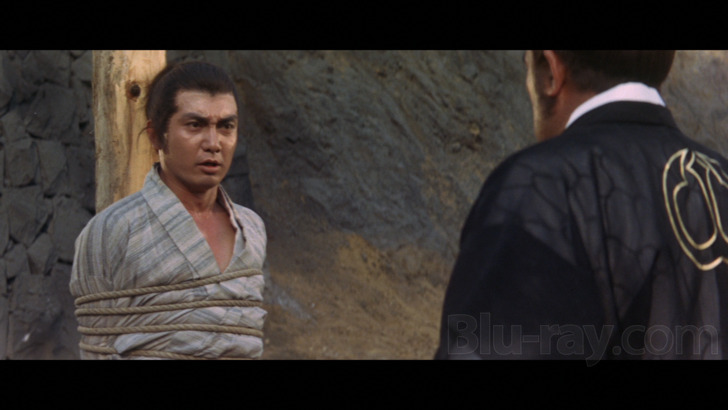
Return of Daimajin offers DTS-HD Master Audio Mono tracks in either Japanese or English. Unlike the first film, which to my ears really presented no hugely discernable difference between the languages other than the languages, the English track on this film is noticeably brasher and overly bright sounding, to the point that higher frequencies may actually bother some listeners. There's also noticeably more punch and midrange to the Japanese language track. The Japanese track on this disc doesn't have the same level of background noise that accompanied the first film's audio presentation in its original language. Optional English subtitles are available.
Return of Daimajin Blu-ray Movie, Special Features and Extras 
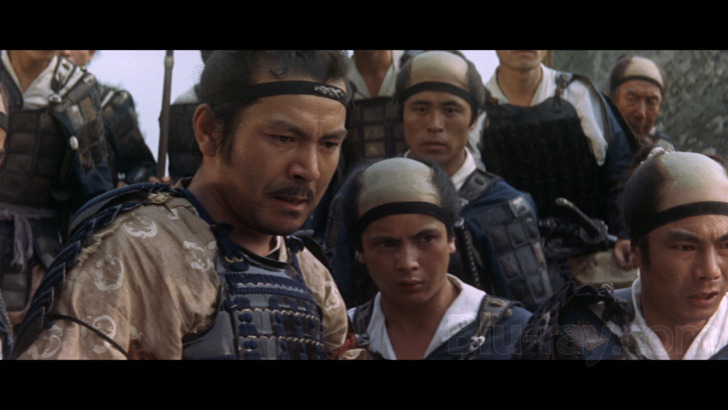
- Audio Commentary by Jasper Sharp and Tom Mes
- My Summer Holidays with Daimajin (HD; 33:45) features professor Yoneo Ota, director of the Toy Film Museum at the Kyoto Film Art Culture Research Institute, discussing the production of the films. In Japanese with English subtitles.
- Alternate Opening Credits are from the US release, which sported the title Return of the Giant Majin.
- 2.35 Version (HD; 00:56)
- 1.33 Version (HD; 00:56)
- Original Theatrical Trailer (HD; 1:55)
- US TV Spot (HD; 1:02)
- Storyboards
- From Storyboard to Screen: Bringing Return of Daimajin to Life (HD; 3:54) features comparisons of storyboards to filmed versions.
- Storyboard Selection (HD) is an image gallery.
- Image Gallery (HD)
Return of Daimajin Blu-ray Movie, Overall Score and Recommendation 
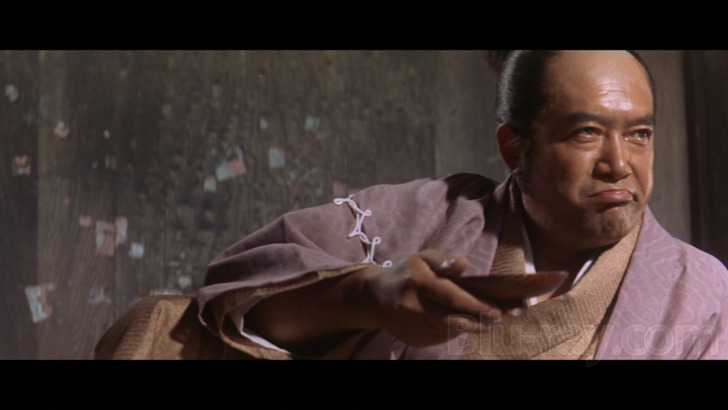
This second Daimajin film probably suffers from that oft mentioned "sophomore slump", and it may come off as especially duplicative if viewed directly after the first film. Technical merits are generally solid, and the supplementary package very enjoyable, for those who are considering making a purchase.
Similar titles
Similar titles you might also like
(Still not reliable for this title)

Daimajin
大魔神
1966

Wrath of Daimajin
大魔神逆襲 / Daimajin Strikes Again / Daimajin gyakushu
1966

Gamera: Guardian of the Universe
Gamera daikaijū kuchu kessen
1995

Gamera 3: Revenge of Iris
1999

Gamera 2: Attack of the Legion
Gamera 2: Region shurai
1996

Gamera vs. Zigra
Gamera tai Shinkai kaijū Jigura
1971

Gamera vs. Jiger
Gamera tai Daimaju Jaiga
1970

Gamera vs. Guiron
Gamera tai daiakuju Giron
1969

Gamera vs. Barugon
Daikaijū kettō: Gamera tai Barugon
1966

Gamera
Daikaijū Gamera / Gamera, the Giant Monster
1965

Gamera vs. Gyaos
Daikaijū kūchūsen: Gamera tai Gyaosu
1967

Gamera vs. Viras
Gamera tai uchu kaijū Bairasu / Destroy All Planets
1968

Godzilla on Monster Island
地球攻撃命令 ゴジラ対ガイガン / Chikyū kogeki meirei: Gojira tai Gaigan / Godzilla vs. Gigan
1972

Gamera: Super Monster
Uchu kaijū Gamera
1980

The Sword of Doom
大菩薩峠 / Dai-bosatsu tōge
1966

Destroy All Monsters
怪獣総進撃 / Kaijū sōshingeki
1968

Ultraman: The Complete Series
ウルトラマン
1966-1967

The Great Yokai War
妖怪大戦争 / Yōkai Daisensō
2005

Godzilla vs. Megalon
ゴジラ対メガロ / Gojira tai Megaro
1973

Terror of Mechagodzilla
メカゴジラの逆襲 / Mekagojira no gyakushu
1975
